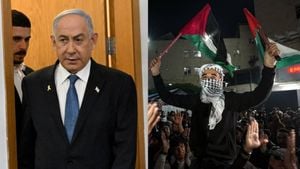Proposed revisions to Indonesia's military law, officially known as Law No. 34 of 2004 concerning the Indonesian National Armed Forces (TNI), have ignited fears of increased military involvement in civilian governance. These concerns have led to widespread protests from various civil society groups, which arise from apprehension about reverting to a militarized state akin to the New Order period.
Months following President Prabowo Subianto's ascent to power, citizen dissatisfaction has surged. Critics are not only opposed to budget cuts impacting public services but also express unease over the expansion of positions filled by former political campaign team members. The recent push to amend the TNI law, allowing military personnel to engage more extensively with civilian institutions, has sparked fears of diminishing democratic values.
According to demonstrations reported throughout Jakarta and other cities, the proposed changes could mirror the abusive military powers seen under the 32-year authoritarian regime of former President Suharto, who is also linked to Prabowo. Fears of history repeating itself have prompted the Civil Society Coalition for Security Sector Reform to voice their strong opposition by citing numerous alarming tendencies apparent within the proposed amendments.
The Coalition highlights specific revisions to Article 47, which would significantly broaden the roles assigned to active military personnel within various ministries beyond previously defined boundaries. The modification could lead to over 2,569 active TNI members filling civilian roles—a scenario already documented this year. This expansion raises serious questions about the appropriateness and legality of such placements. For example, reports indicate active military officers like Major Teddy Indra Wijaya serving as Cabinet Secretary, posing complex issues about their integration within civil frameworks.
Defense analyst Khairul Fahmi has expressed the necessity for stricter regulations concerning military assignments to prevent any misinterpretations of authority and possible abuses of power. He stated, “The mechanism for oversight of military assignments must be tightened. The parliament and the national defense ministry should have periodic evaluation mechanisms.” Missing this opportunity, he fears, would only play directly to the era of the dual-function military, which many argue stands contrary to democratic governance.
Residents and protestors are vocal about their desire to maintain distance between the military's roles and political affairs. Such fears were echoed by Fahmi when he emphasized, “The military's role should remain zero percent in politics.” The sentiment reflects deep-rooted concerns about potential political manipulations and the erosion of civilian governance principles.
Further revamping age regulations, the amendments suggest extending retirement ages for military personnel, leading many to argue this might create inefficiency and potentially exacerbate internal conflicts within the TNI. Critics within the Coalition argue this risks oversaturations of military officers and may lead to stagnation within hierarchical progress.
Major General Hariyanto, representing the Indonesian military, reinforced the commitment to align the TNI law’s revisions with its core defense responsibilities. He remarked, “We remain committed to follow and provide input as per the organizational needs concerning the revision of the TNI law,” underlining the military’s intention to act within the policing of such regulations.
Despite these reassurances, observers remain skeptical. Many argue these amendments could, directly or indirectly, invite more militaristic solutions to societal issues, endorsed as ways to promote development but undermining core democratic values. This paradox has been noted by civil groups asserting reforms should align more closely with non-militaristic government initiatives and transparent operations.
Drawing parallels to historical frameworks, experts view these changes as potentially laying the groundwork for progressive military roles at the expense of civilian authority. Given the grim consequences faced during the New Order era, many advocates view this as unacceptable.
Without immediate intervention and feedback from citizens, the potential ramifications of these military law changes nonetheless remain troubling. Previous missteps arising from the melding of military and civilian roles could become politically toxic especially as public confidence erodes, leading to the undermining of hard-fought democratic freedoms.
The need for expanded civil society engagement and accountability mechanisms is more pertinent than ever. Should current trends continue unchecked, many fear Indonesia might be on the brink of stepping back to darker times. Proponents of democracy urge comprehensive evaluations and public discussions as the legislative process progresses, reiteratively calling for respectable distance between military and civilian sectors to preserve the sanctity of Indonesia’s democratic structure.



